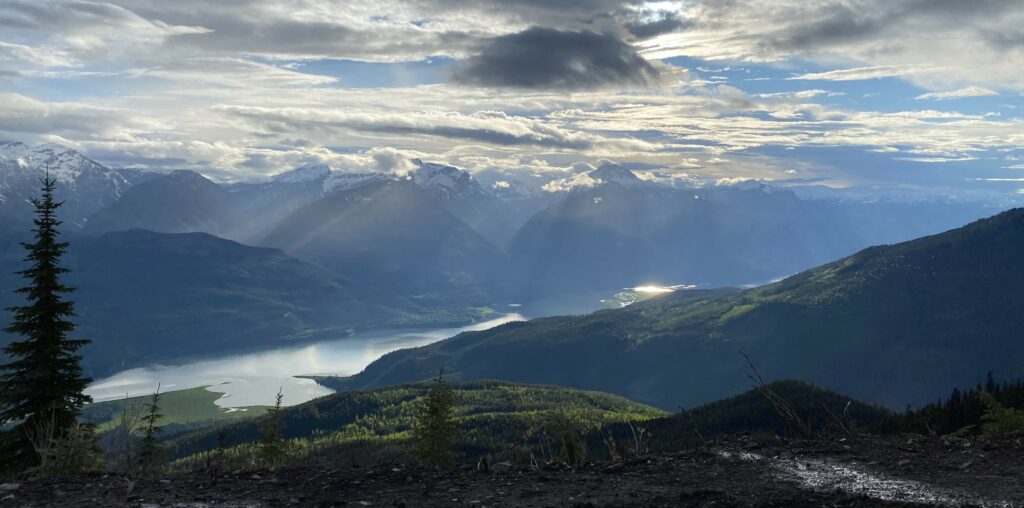Date: November 29th 2022 – Read Time: 2 minutes – Author: Adam Kunis
Swah’netk’qhu
–
Imagine waking up to a job you love; Waking up to a community that cares; Waking up to the sound of birds chirping, clean water, and a breath of fresh air.
–
This world exists. A magical land, safe-guarded by ancient traditions.
Those who dare search for it seek an ultimate treasure.
A way of life that has made many wildly rich.
–
It knows many names
And can be found in all corners of the Earth.
But it is fleeting. Always slipping away.
–
This is the continuous search for Sustainability.
A never ending journey.
A quest to lift the fallen, care for the land and enjoy the finest luxuries of life.
Now more than ever the world has woken up to the “need for sustainability”. Climate disasters make headline news. Workers face a mental health crisis and businesses continue to struggle with ever increasing operational costs. Where is this sustainable world? Where does sustainability exist?
It exists in the land:
The ancient redwood forests along California’s northern coast which have been managed by the Sinkoyne tribes for thousands of years.
It exists in community:
The traditions, ceremonies and stories of the First Peoples of Turtle Island passed down from generation to generation for time immemorial.
It exists in products:
A low emissions vehicle with over a million kilometers; a 350-year-old Stradivali violin; and the winery that has produced the same product on the same piece of land for centuries.
How did they do it? Was it luck? Maybe, but more likely they had a plan. They had a plan to foresee the challenges of the future. A plan to act now so that their choices today improved the quality of life and resilience of tomorrow.
–
Planning is essential.
A business does not survive 500 years or 50 years or let alone 5 without one.
Just as we plan for our businesses, so too must we plan for sustainability.
Because whether it is a climate catastrophe, war, racism or recession, “it’s not a matter of if a society will face a crisis, but when” (Ritchie 2004).
BUT THERE IS GOOD NEWS! There is a path, or rather many paths, that lead to a more sustainable future.
Scientists make ground breaking discoveries every day.
The oppressed have their voices amplified to the world arena.
And the businesses. The businesses are the ones who transform small steps into giant strides.
Every business or organization has a unique sustainability dream and GreenStep cherishes the opportunity to help make them a reality. By collaborating with organizations to create structured, yet flexible action plans for sustainability, we can better prepare for the challenges of the future as “only planning can avert negative impacts” (Gunn 1979).
With transparent Sustainability Actions Plans, the days of greenwashing will be gone. Organizations will no longer hide their sustainability initiatives in the shadows. Businesses will work together to build a brighter, more resilient future. A future where businesses are 50-80% more profitable from operational efficiencies (Willard 2012); a future where employees love what they do; and a future where the beauty of the natural world once again serves as our greatest inspiration.
–
To learn more about Sustainability Action Plans visit:
https://www.greensteptourism.com/how-to-create-a-sustainability-action-plan-for-your-tourism-business/
Or book a free consult with GreenStep Solutions:
https://greenstep.ca/customer-portfolio/
–
Further Readings and Examples:
Tourism Revelstoke (2022). Sustain the Stoke: Plan Your Visit. https://seerevelstoke.com/plan-your-visit/sustainable-revelstoke/
Ritchie, B. W. (2004). Chaos, crises and disasters: A strategic approach to crisis management in the tourism industry. Tourism Management, 25(6), 669–683. https://doi.org/10.1016/j.tourman.2003.09.004
Gunn, C. (1979). Tourism Planning. https://www.mosaicbooks.ca/item/nQZ2RFtFnYG-_uPXgR431A
Willard, Bob. The New Sustainability Advantage : Seven Business Case Benefits of a Triple Bottom Line. 2012. https://orl.bibliocommons.com/v2/record/S111C522229
About the Author: Adam Kunis is a Sustainable Tourism Specialist with GreenStep and a visitor to the traditional lands of the Sylix people in Kelowna, British Columbia. His professional background includes academic research, community engagement, sustainability planning, and marketing. Adam is passionate about the mountains, his garden, music, and comedy.

